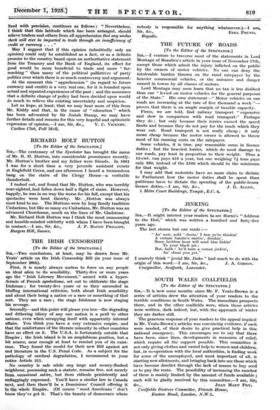THE IRISH CENSORSHIP [To the Editor of the SPECTATOR.] Snt,--Two
Conclusions, at least, may be drawn from Mr. Yeats' article on the Irish Censorship Bill (in your issue of SepteMber 29th).
First, it is nearly always useless to force on any people an ideal alien to its sensibility. Thirty-five or more years ago the " Irish Literary Movement," armed with a hyper- dermic of French symbolisme, set out to obliterate the stage Irishman ; for twenty-five years or so they succeeded in bluffing international criticism, both about Irish sensibility and about their being a nation or a race or something Of that sort. They are a race ; the stage Irishman is now staging his revenge.
Secondly—and this point will please you less—the degrading and dithering idiocy of any one nation is a peril to other nations, -even when 'occupying itself with apparently internal affairs. You think you have a very 'extensive empire, and that the misfortunes of the literate minority in other countries have no effect on it. The U.S.A. is fortunately outside that Empire ; the Irish island is in an amphibious position, but a bit nearer, near enough at least to remind you of its exist- ence. They found the model for their new Bill against art and literature in the U.S. Penal Code. As a subject for the pathology of cerebral degradation, I recommend to your notice Article 211.
No country is safe while any large and money-flushed neighbour, possessing such a statute, remains free, not merely from occasional satire, but from ridicule persistently and unflaggingly expressed. You'll have a similar law in Canada next, and then there'll be a Dominions" Council offering it to. the Whole Empire, (Of course " Plod. Ainericans " dOn't know they've got it. That's the beauty of democracy where
nobody is responsible for anything Whatsoever.)—I am,








































 Previous page
Previous page